![[safe]](safe.gif)

The Object of My Affection
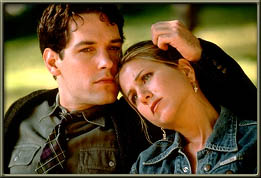
Starring Jennifer Aniston, Paul Rudd, John Pankow, Alan Alda,
Allison Janney, Nigel Hawthorne, Tim Daly, Amo Gulinello, Steve Zahn
Directed by Nicholas Hytner
![[safe]](safe.gif)


Somewhere in the middle of this movie, Rodney Fraser (Nigel Hawthorne), an aging theater critic, tells Nina Borowski (Jennifer Aniston), that "one should not be too hard on oneself if the object of one's affection returns the favor with less enthusiasm than one might have hoped". Again, at the end of the film, George Hansen (Paul Rudd), repeats to Nina the words she had spoken to him the night before during an ugly fight, that "it's not about having it all, it's about one person being enough." At moments like these, "The Object of My Affection" literally reaches out a hand to the audience's heart and squeezes it tight. Pulitzer-prize winning playwright Wendy Wasserstein's decade of churning out draft after draft of adaptations of Stephen McCauley's wistfully comedic and frankly melancholic novel has resulted in a screenplay that more often than not hits home with a ferocious intensity which the actors collectively, under the deft direction of Nicholas Hytner, bring to life in one of the most complex, intelligent and moving dramatic comedies this year.
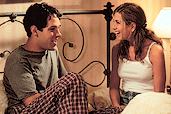 The basic premise of the film is one which takes the Jules-George relationship in "My Best Friend's Wedding" to a more intimate and realistic level. Nina is a social worker with a bulldozer of a boyfriend, Vince (John Pankow), whom she's not sure she really loves. At a dinner party hosted by her insufferably witchy stepsister Constance (Allison Janney) and her husband Sidney (Alan Alda), Nina meets George, a grade-school teacher who's unknowingly been dumped by his longtime boyfriend Robert Joley (Tim Daly) over the course of dinner. Feeling a connection with him, Nina
The basic premise of the film is one which takes the Jules-George relationship in "My Best Friend's Wedding" to a more intimate and realistic level. Nina is a social worker with a bulldozer of a boyfriend, Vince (John Pankow), whom she's not sure she really loves. At a dinner party hosted by her insufferably witchy stepsister Constance (Allison Janney) and her husband Sidney (Alan Alda), Nina meets George, a grade-school teacher who's unknowingly been dumped by his longtime boyfriend Robert Joley (Tim Daly) over the course of dinner. Feeling a connection with him, Nina 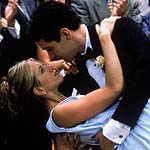 invites him to move into her apartment while he sorts out his life. What begins as a temporary living arrangement soon blossoms into a friendship which sounds off alarm bells in both Vince and Constance's minds. Nina and George share a believably real friendship born out of dancing lessons, late night ice cream feasts and an honesty uncommon between most men and women. When Nina learns she's pregnant with Vince's child, she begs George to raise the child with her, urging him that they can make up new rules for themselves. After some hesitation, George accepts. However, it is not long before Nina's mounting romantic feelings for George, and his ambivalence toward her, begin to crack up their relationship. When George falls hard for an actor Paul (Amo Gulinello), a jealous and increasingly frustrated Nina is left with the realization that, perhaps, she and George can't transcend the boundaries between love and mere affection.
invites him to move into her apartment while he sorts out his life. What begins as a temporary living arrangement soon blossoms into a friendship which sounds off alarm bells in both Vince and Constance's minds. Nina and George share a believably real friendship born out of dancing lessons, late night ice cream feasts and an honesty uncommon between most men and women. When Nina learns she's pregnant with Vince's child, she begs George to raise the child with her, urging him that they can make up new rules for themselves. After some hesitation, George accepts. However, it is not long before Nina's mounting romantic feelings for George, and his ambivalence toward her, begin to crack up their relationship. When George falls hard for an actor Paul (Amo Gulinello), a jealous and increasingly frustrated Nina is left with the realization that, perhaps, she and George can't transcend the boundaries between love and mere affection.
While the film has been billed as a romantic comedy, it more accurately falls within the realm of drama. Wasserstein's script occasionally exhibits strong signs of situation comedy, with rapid fire dialogue and quick scene changes that parallel each other, but for the most part, the story being played out is neither very funny nor light-hearted. Nina and George's struggle to navigate the messy circumstances of a friendship that goes beyond the platonic and obvious, into the meeting of minds and souls, is hardly a laughing matter. Yet, there are laughs to be found, mostly courtesy of Constance and Sidney, two caricatures whose rich, bourgeois lifestyle serves as a counterpoint to the grounded reality that George and Nina share. Working within the confines of a big studio system, and a public climate that is open but not necessarily ready to wholeheartedly embrace George's gay world, Wasserstein's script seems less buoyant than its source novel, and misses many opportunities to delve into hitherto unexplored possibilities in cinema. That said, what is left onscreen represents quite an improvement nonetheless; the gay community may have been painted as being somewhat too uniform and presented with too rosy a view, but this sure beats the unbelievable stereotypes we've so far seen in "The Birdcage" and "In and Out".
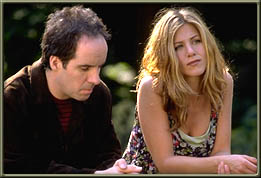
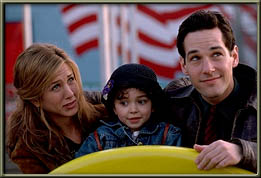
What's more important is that Wasserstein's dialogue often reaches a level of emotional truth and urgency which makes the film rise above the genre. The penultimate scene in the film, a confrontation between Nina and George, is not only searingly written, it is also exquisitely played by both Aniston and Rudd, who perform beyond expectations here.
Director Nicholas Hytner tackles a modern-day subject matter after the twin successes of "The Madness of King George" and "The Crucible" with a sure, slick hand. What is unique in his approach is the fuzzy focus he chooses to employ in terms of camera technique and editing to give both Nina and George's characters equal investment in the hearts of the audience. This is neither Nina nor George's story; it's about both of them, and the delicate dance they do is one which Hytner understands and fully exploits. He elicits some very strong performances from everyone in the cast, and moves the film along at an even, unhurried pace which is comfortable and engaging. He is aided considerably by George Fenton's light and poignant score which never feels intrusive nor out of place - a definite improvement over his previous work for "Dangerous Beauty".
Amo Gulinello, making his film debut as Paul, the object of George's affection, is perhaps the weakest player in the cast. Saddled with a role that has been vastly diminished from the source novel's interpretation, and given little screen time, he barely leaves an impression and fails to display the qualities which would draw George away from Nina. Aside from this, the rest of the cast sparkles. Allison Janney, Alan Alda and Steve Zahn are ceaselessly funny as the sitcom characters who are shallow and pretentious, but the actors manage to inject some level of humanity not found on the page into their performances.
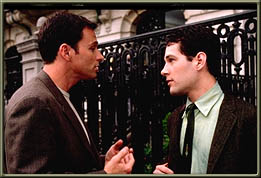
John Pankow plays Vince as Ira, the character he plays on "Mad About You", if Ira did not have the Buchmans to soothe his soul. The character is somewhat dislikable and Pankow has the difficult task of moving through some very contrary behavior and still coming off as believable. Likewise, Tim Daly tries hard to humanize the plastic, one-note Robert Joley. Both of them succeed at some level, but not entirely. In contrast, Nigel Hawthorne gives a bravura, scene-stealing turn as Rodney Fraser, Paul's platonic mentor whose position mirrors that of Nina's as the objects of both their affections become enamored with one another. Hawthorne brings an old-world charm and a touch of class to the proceedings, and although he appears late in the film, his is the one performance amongst the supporting cast that threatens to overshadow the leads.
Aniston and Rudd are both rampantly charming; Rudd, in particular, seems to radiate it from every pore. Aniston, performing way beyond expectations, finally shakes off some of her sitcom shtick and emotes from a level not apparent previously. The only member of the "Friends" cast who really seems to have a shot at a successful film career, she plays Nina with the right amount of pathos and sensibility, and exhibits a range of emotions that bring Nina's pain to life. As the titular character, Rudd gives a performance that not only shuns every known gay stereotype, but which is genuinely befuddled and moving; the audience feels his conflict and understands his confusion and torn loyalties. Both of them are excellent in their scenes together; they share a chemistry that makes their pairing as friends utterly believable, but which calls into question their possibility as a romantic couple.

There never is a point in the film where Nina "falls in love" with George and vice versa. Instead, the film chooses to explore it realistically, with characters sometimes never fully understanding why they act the way they do, nor aware of the consequences of their actions. This is best exemplified by the scene where Nina and George are on the edge of crossing the line between friendship and sex - the conflict in emotions and desires displayed by Aniston and Rudd as they play this scene is palpably real. It is the many moments like these in the film which make "The Object of My Affection" something memorably real and heartbreaking.